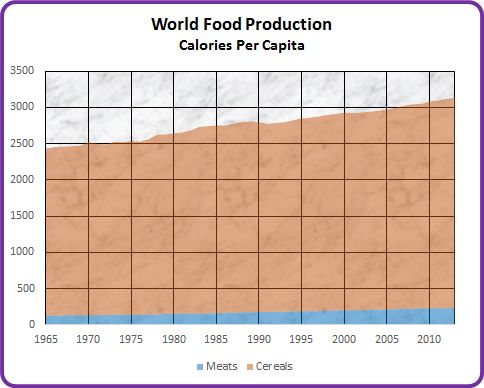Environment & Energy
Related: About this forumWhat does the world eat?
The environmental movement pays a lot of attention to the amount of meat people eat. The attention is, of course, legitimate. Meat is at the top of the food chain, and as a result causes a disproportionate amount of ecological damage per calorie compared to our other main source of calories, cereal grains. Not to mention sentience issues and the morality of raising captive beings in deplorable conditions just so we can grind them up and stuff them down our gullets.
Since ferreting out global truths and contrasting them with public perception is one of my hobbies, I decided to find out how many calories per person are produced from each of these sources as a global average. As usual, our good friends at the FAO have the data readily to hand. Here's what it shows.

Today the average human citizen of the Earth gets 92.5% of their calories from grains, and 7.5% from meats.
This proportion is changing over time - in 1965 the proportion was 95% grains, and 5% meat.
Since 1965, average per capita meat production has gone up from 125 calories/day to 235 calories per day, while grain production has gone up from 2300 to 2900 calories per day.
When population growth is factored in, the production of grain calories has gone up over 2.5 times since 1965, while the production of meat calories has quadrupled. No matter how you slice, dice, bake or roast the data, that's a lot of environmental damage.
Lest anyone think I'm taking some moralistic high ground here, my diet is the exact reverse of the "average" shown above. I eat about 92.5% meat calories, with a scant 7.5% coming from grains and other sugars.
But it did surprise me to find out how little meat the population of our planet actually eats. From the tone of the internet articles, I would have assumed that most people ate more like I do.
Erich Bloodaxe BSN
(14,733 posts)
lapfog_1
(29,227 posts)to a very large degree the worlds eats oil.
for fertilizer, for planting and tilling and harvesting and transport and distribution.
sue4e3
(731 posts)sue4e3
(731 posts)and it can be done so it doesn't look like bugs
GliderGuider
(21,088 posts)Not feeding them might be a good beginning. ![]()
sue4e3
(731 posts)GliderGuider
(21,088 posts)According to my analysis linked below, a truly sustainable world population is well under 100 million - or about 1% of the current population.
http://www.paulchefurka.ca/Sustainability.html
sue4e3
(731 posts)I don't want it to be my children and neither does any one else. So who gets lucky and who don't . On the same premise as be careful what you wish for. I understand though I get so tired of the never ending worry for my children. I don't worry for myself. I've been here a while . I figure I'm willing to see whats next. I don't want to watch it fall down on them.
GliderGuider
(21,088 posts)I've come to terms with the idea that the human load on the planet will diminish, even if the collapse of the familiar crushes me and those I love in the process. The biosphere is far more important than my own life, though I still retain my monkey curiosity about what's going to happen, and my selfish desire to see some of it unfold.
hunter
(38,334 posts)
https://en.wikipedia.org/wiki/Soylent_Green
Just don't get scooped up by Riot Control.
It'll all be fine.
GliderGuider
(21,088 posts)Apparently the raw production of vegetables, fruit, pulses, and tubers totals up to about 500-600 calories/day per capita in 2013.
That's twice the amount provided by meat. When those additional calorie sources are included, the proportion of meat calories in the "average human diet" drops to about 6.5%.
About 1/3 of all potential calories appear to be wasted through spoilage or rejection.
IMO the use of grain (which is essentially sugar) as our main caloric staple is the biggest issue with our diet, both in terms of its impact on our health and its associated level of environmental and ecological damage. Just to give one example of the latter, over half of all the arable (i.e. best) land on earth is covered with cereal crops, making it unavailable as habitat for other plant or animal species.